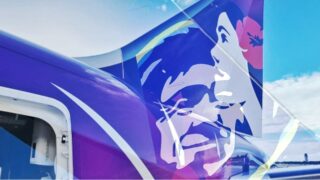Alaska Airlines agreed to acquire Hawaiian Airlines in a deal valued at nearly $2 billion, which includes its routes, fleet, brand identity, and other assets. But even before the deal dust has settled, new signs are emerging that Alaska’s control over the Hawaiian name may not be as secure as expected.
A revealing court battle between Alaska and Delta over a different airline brand, one also familiar to Hawaii, highlights the complexity of brand ownership and why defending a name like Hawaiian might not be so straightforward.
Could Alaska’s legal fight with Delta flow over to Hawaiian?
At first glance, Alaska’s lawsuit has nothing to do with Hawaii. The airline is currently locked in a legal dispute with Delta over trademark rights to the Virgin brand, stemming from Alaska’s 2016 acquisition of Virgin America. Alaska dropped the Virgin name years ago but is still paying millions to license it, including $8 million annually through 2039, under a court ruling in the United Kingdom.
Alaska now says Delta is violating that agreement. Through its ongoing joint venture with Virgin Atlantic, Delta continues to market and benefit from the Virgin brand in the U.S. That’s a move that Alaska claims breaches its exclusive rights. To support its case in the UK, Alaska subpoenaed Delta executives in Georgia federal court, seeking documents and testimony under oath.
Why does this matter for Hawaiian? Because the Virgin fight shows just how fragile airline brand ownership can be. Hawaiian isn’t named in the lawsuit, but if Alaska is already struggling to enforce exclusivity on one brand, it raises the question of whether similar conflicts could emerge around its new Hawaiian name.
Delta’s partnership with Hawaiian ended. Does any branding remain?
On June 30, Delta officially ended its long-standing partnership with Hawaiian Airlines. That meant no more codeshare routes, no more interisland redemptions, and no more earning SkyMiles when flying on Hawaiian planes. The breakup was expected following the announcement of the Alaska–Hawaiian deal. What wasn’t expected was that the branding may not have wholly disappeared.
Even after the partnership ended, some readers reported seeing sponsored Delta ads that used the phrase Hawaiian Airlines to promote Delta flights. While these may have been in error, or geo-targeted or keyword-driven, BOH has not personally seen the ads served to us here in Hawaii. Bidding on a competitor’s brand in Google Ads is legal if the ad content is not misleading. Still, if true, the result can be confusing.
It is unclear whether Delta is playing dirty, exploiting keyword loopholes, or doing absolutely nothing wrong at all. However, the takeaway is the same: Alaska is paying top dollar for a brand it now has to closely monitor.
Alaska Airlines and its new Hawaiian brand.
When Alaska announced its acquisition of Hawaiian, it promised to preserve the Hawaiian Airlines name and identity indefinitely. That dual-brand approach was an integral part of the pitch to regulators and to the public. The Department of Transportation initially mandated that the Hawaiian brand be maintained for six years, which now stands at five.
But court rulings don’t always favor intentions. In the Virgin case, Alaska is now being forced to honor licensing fees even after dropping the brand entirely. What happens if another airline uses “Hawaiian Airlines” in a way that feels misleading but doesn’t explicitly violate the letter of the law? Alaska must enforce its brand rights quickly and decisively to retain the full value of the name.
What Hawaiian Airlines branding means for Hawaii travelers.
For many visitors, flying Hawaiian isn’t just about a seat on a plane. It’s part of the experience. The name evokes island hospitality from start to finish, onboard meals, and a cultural connection that mainland carriers always struggle to replicate. That brand reputation took many decades to build.
However, with routes shifting, partnerships dissolving, and the airline’s future rapidly changing, travelers are becoming increasingly confused. One reader wrote, “I thought I booked Hawaiian from LAX to Hilo, but it was Alaska the whole way. Nice flight, but it wasn’t what I expected.”
That mismatch matters. Even if not a legal requirement, a brand is a promise. If multiple airlines are allowed to market or tag content with “Hawaiian Airlines,” the traveler may not know precisely what they are getting until they board. And in an era of shrinking legroom, paid meals, and rising fares, that feeling is becoming too prevalent.
Why the Hawaiian Airlines name is worth a fortune.
There’s a reason Alaska paid so much to acquire a smaller airline with an aging interisland fleet and limited true long-haul reach. Beyond its valuable Dreamliner fleet and international expertise, Hawaiian Airlines holds global recognition. Hawaii and Hawaiian mean something not just to Hawaii residents, but to travelers across the Pacific and beyond. That’s why carriers like United, Delta, Southwest, and American have fought so hard to retain a foothold here in Hawaii. It’s also why Alaska is now fighting battles on multiple fronts. And, there’s every reason to believe that we are not seeing the last of airlines repositioning for Hawaii.
The Virgin case shows how hard it is to keep control of a name, even when you’re writing the checks. The Hawaiian name is arguably far more valuable, and potentially also vulnerable.
What’s next in the airline branding battle?
If Alaska wins its fight over the Virgin brand, it could signal a tougher approach. But if it loses or settles, it may send a different message: that even big-name acquisitions don’t entirely guarantee branding exclusivity.
Either way, the days of assuming that the Hawaiian name means one airline, one experience, or one company could be changing fast. As the acquisition finalizes and competitors circle, Alaska will have to assert control over the brand it just acquired.
Lead Photo Credit: Beat of Hawaii at SALT in Honolulu.
Get Breaking Hawaii Travel News







Delta is going to win. Alaska isn’t smart picking a fight with the strongest financially among the US airlines, Delta has money to blow Alaska doesn’t.
My wife and I first traveled to Hawaii since 1979 on various airlines., some of which are no longer around. In 2018 our son’s family moved to Lahaina. When we made our first trip to visit them in 2018, we decided to try Hawaiian Air. We “standardized” on Hawaiian after that first roundtrip. It was not too long until we had Puulani status. There has always been a special something from our flight attendants that make our trips better. When I have flown other domestic flights, I often get the feeling from the FAs that I am just a bother in their work schedule. I suppose that is something that will eventually disappear too, the aloha from the Hawaiian staff.
Better batten down the hatches, boys. Alaska has just revealed a completely new livery for the 787s being acquired from Hawaiian. They’re dropping Chester in favor of a new Northern Lights theme. They claim this livery will only be on the 787s, while the rest of the Alaska fleet will retain Chester, and the remainder of the Hawaiian fleet will retain Pualani.
Sadly if the brand was *truely* valuable, then Hawaiian never would have filed for bankruptcy.
Delta bought into Virgin Atlantic with a hefty ownership % and wants to do whatever it can to go after Alaska and was behind this enforcement. Even Richard Branson told aviation media he would consider a new Virgin brand for the US after Alaska shuttered Virgin America, which means Virgin Group figured it was game over.
Haolenate, safe to say you don’t have a very good understanding of Hawaii, Hawaiian Air’s place in that or what lead to the financial situation to make them vulnerable to the Alaska deal.